Figuring out the mechanics of your bigger kitchen appliances can be tricky. Do you ever feel like your refrigerator is making the room feel warmer than it should be and don't know if it's normal? Well, we've done plenty of research and have the answer waiting here for you. Let's get into it.
Yes, the refrigerator can make a room feel hot. Although this won't usually be noticeable, the more a fridge runs, the warmer the area around it will feel. So, if your fridge continues running for long periods, expect a temperature increase.
However, as long as you keep your appliance's doors closed and practice good food storage habits, it shouldn't need to overwork itself and get hot, so this is preventable.
As we begin, we will cover all things refrigerators and discuss how your appliance may be affecting the temperature around it. Whether you've noticed this for a while or just started to feel the heat, we're here to offer some help. With that said, let's dive right into this post!

Why Does A Refrigerator Get Hot?
Your refrigerator will typically get warmer the longer it runs. This can happen because your appliance's doors keep being opened or even if a fridge is filled with food, thus causing it to work extra hard to maintain its internal temperature.
On top of that, an older refrigerator's compressor and condenser fan motor may need to work harder to keep the inside cold, regardless of the amount of food/door opening, so age can also affect this.
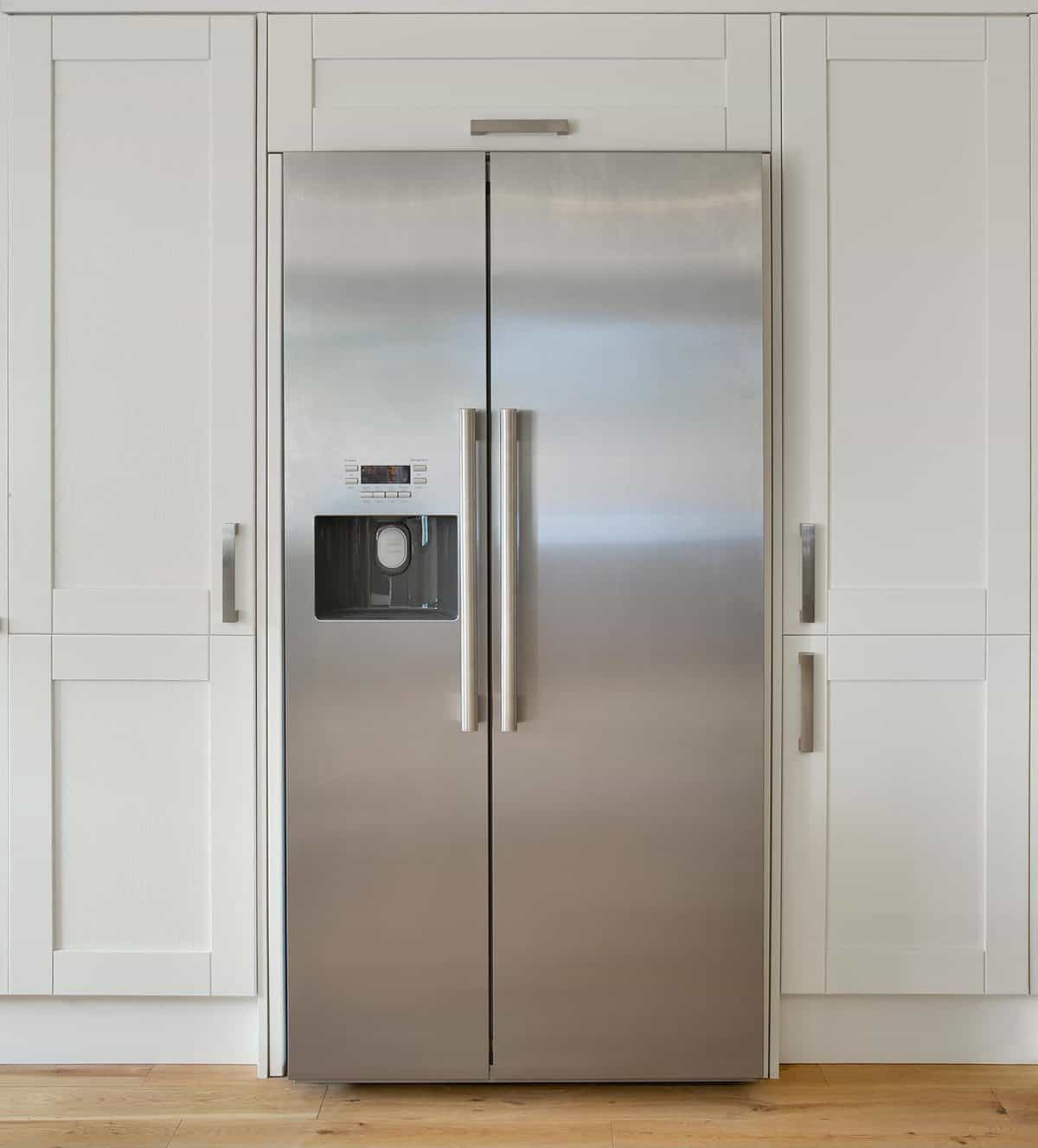
Again, it is normal for a refrigerator to feel warm towards its bottom vent while it's on, so there's no need to be alarmed by this.
Should A Refrigerator Be Hot To The Touch?
Although it is normal for a fridge to release warm air from its lower exhaust vent, your appliance shouldn't feel hot to the touch. Considering the bottom of your refrigerator will be where heat is coming from, the sides, top, and doors should not feel super warm.
If your fridge does feel hot or warmer than usual, this could mean there's something internally wrong. In that case, we recommend calling in a professional.
Especially for older refrigerators, the motor or condenser in your appliance could be dying/defective, which can lead to overheating.
How Much Heat Does A Refrigerator Add To A Room?
In general, a refrigerator will add about 600 joules of heat to a room while it runs. Of course, this will only be a few degrees of actual temperature added to your space but can make a difference after a while.
As we said above, the more a fridge works, the more heat it releases, so try to keep the doors of your appliance closed and the food inside evenly stored.
Can A Refrigerator Cool A Room?
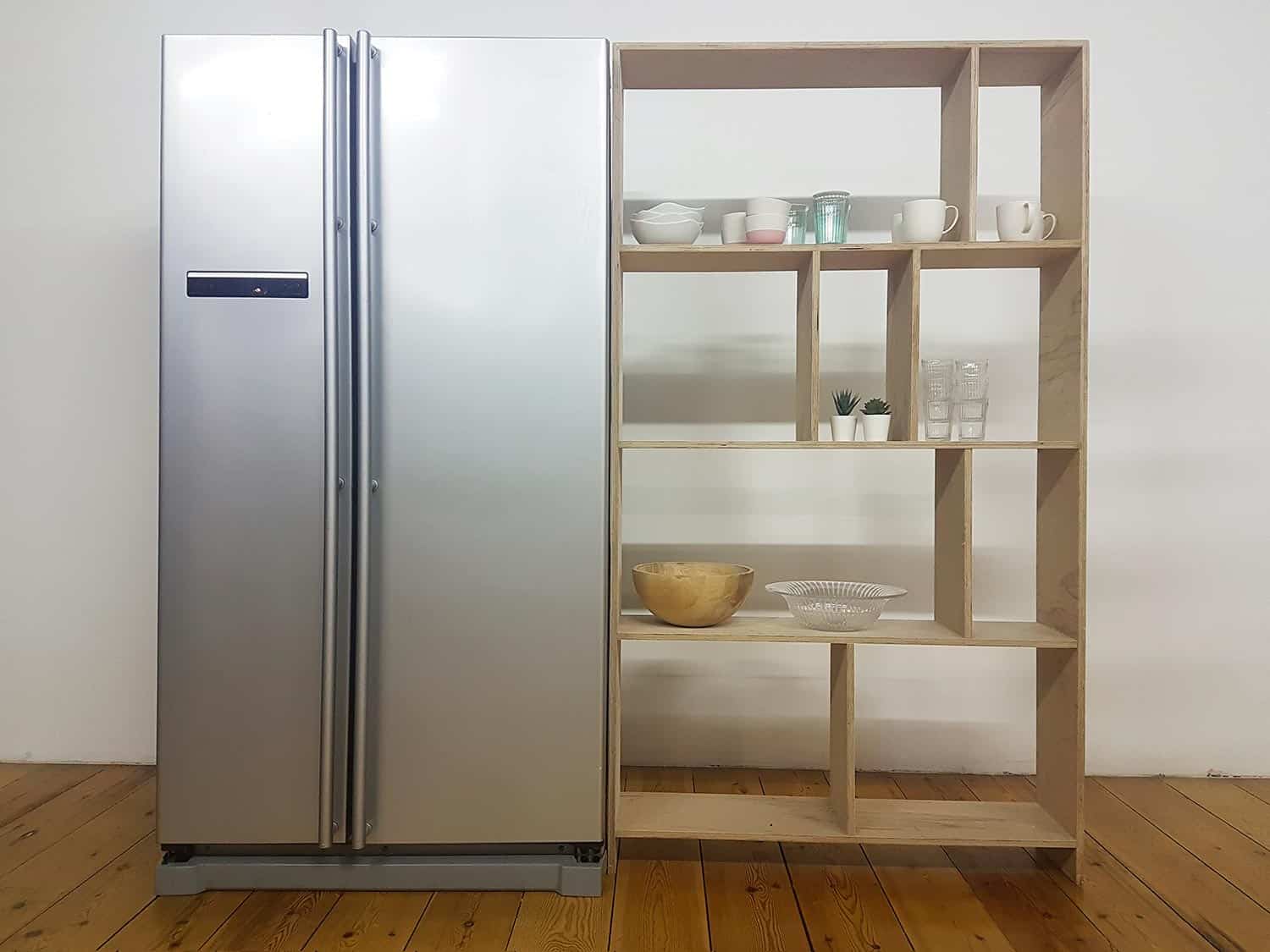
No, unfortunately, a refrigerator cannot cool a room. Although leaving the door open sounds like a good idea, doing this can increase the overall temperature in your space.
When you leave the doors of a fridge open for more than a few seconds, cold air essentially leaks out of your appliance, causing the internal temperature to rise and your refrigerator to begin running.
It does this to cool down the inside chamber so your food won't spoil but can cause excess amounts of heat to release out from underneath your fridge.
Where Does The Heat From A Fridge Go?
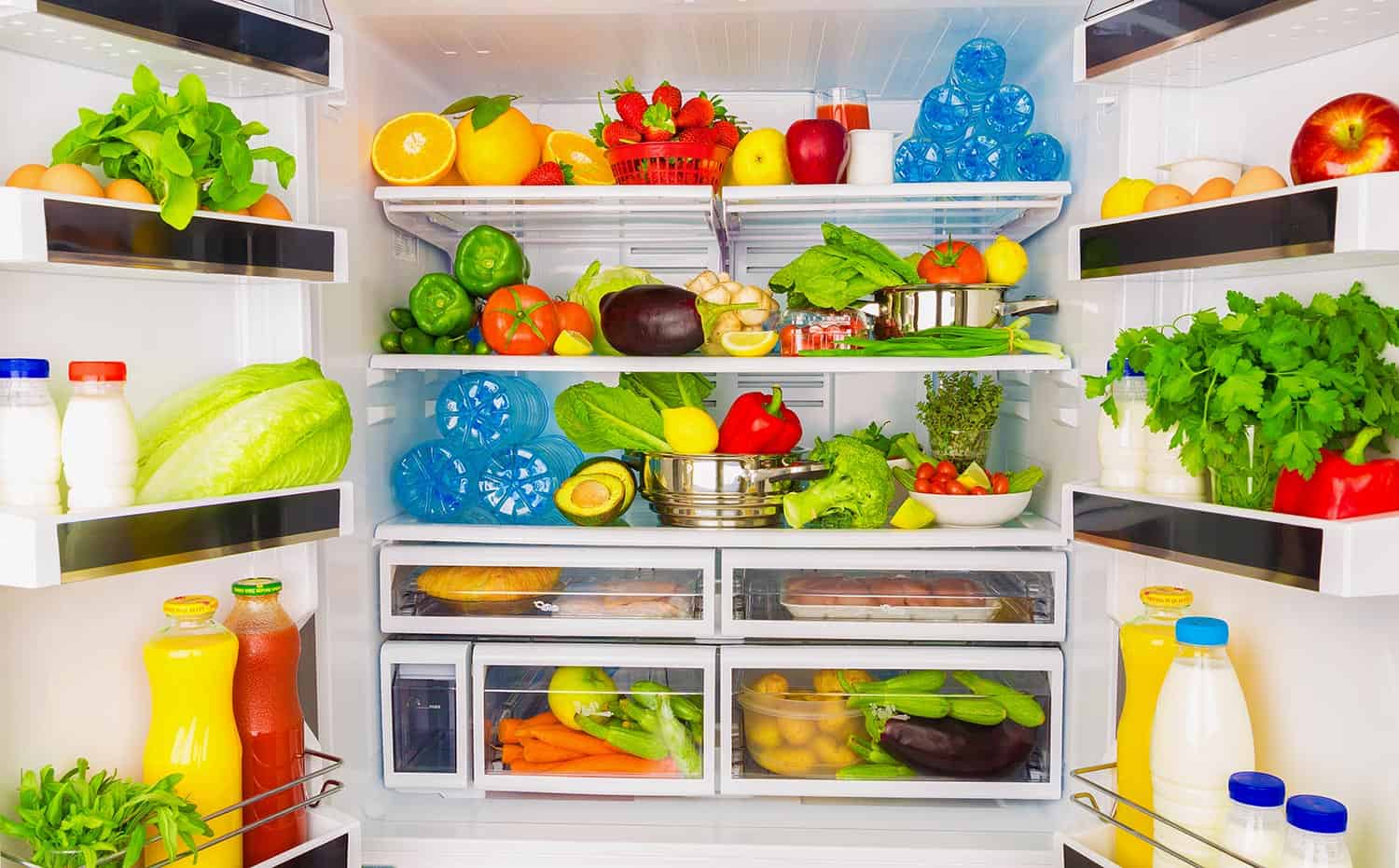
For those wondering where the built-up heat in a refrigerator goes, it will typically come from the exhaust vent. You can find these vents towards the bottom of your fridge and should be able to feel warm air blowing from them.
On top of that, a refrigerator uses a liquid called coolant, which is what brings down the inside temperatures of your appliance. However, the pressure and heat that this process creates are what can cause a warmer temperature on the outside of your refrigerator, hence the need for venting.
Where Does The Heat From A Freezer Go?
The heat from a freezer goes to the refrigerant within the evaporator and essentially evaporates. A compressor will move the refrigerant in and out of a freezer to keep the internal temperatures down and release excess heat from the back or underneath of your fridge.
A freezer may also have a pipe containing refrigerant (a special kind of liquid coolant), which draws the coolant and vaporizes it, lowering the temperature inside. However, this applies mainly to chest-style freezers.
That said, regardless of how a freezer is configured, its exterior shouldn't ever feel super warm/hot to the touch.
How Many Hours Per Day Should A Refrigerator Run?
Most times, a refrigerator will run for eight hours per day. Of course, if your fridge is on, it's technically always running, although it shouldn't be actively working to cool down 24/7.
Typically, a fridge will run according to how much you're using it and the amount of food inside, so you might hear it run for closer to 9-10 hours if it's full or you keep opening it for snacks. Again, it's normal to hear a slight humming whenever you are near a refrigerator, but it shouldn't constantly be running.
Why Does My Refrigerator Keep Running?
For anyone noticing their fridge run for super long periods, this could be due to a few things. Most commonly, a faulty defrost timer is to blame.
Your refrigerator's condenser coil(s) could also be dirty or clogged, which in turn can cause it to continue running for hours on end.
Furthermore, your appliance may have a dying or faulty compressor/motor, so constant running usually indicates a more mechanical problem.
Do Refrigerators Have To Work Harder In Hot Weather?
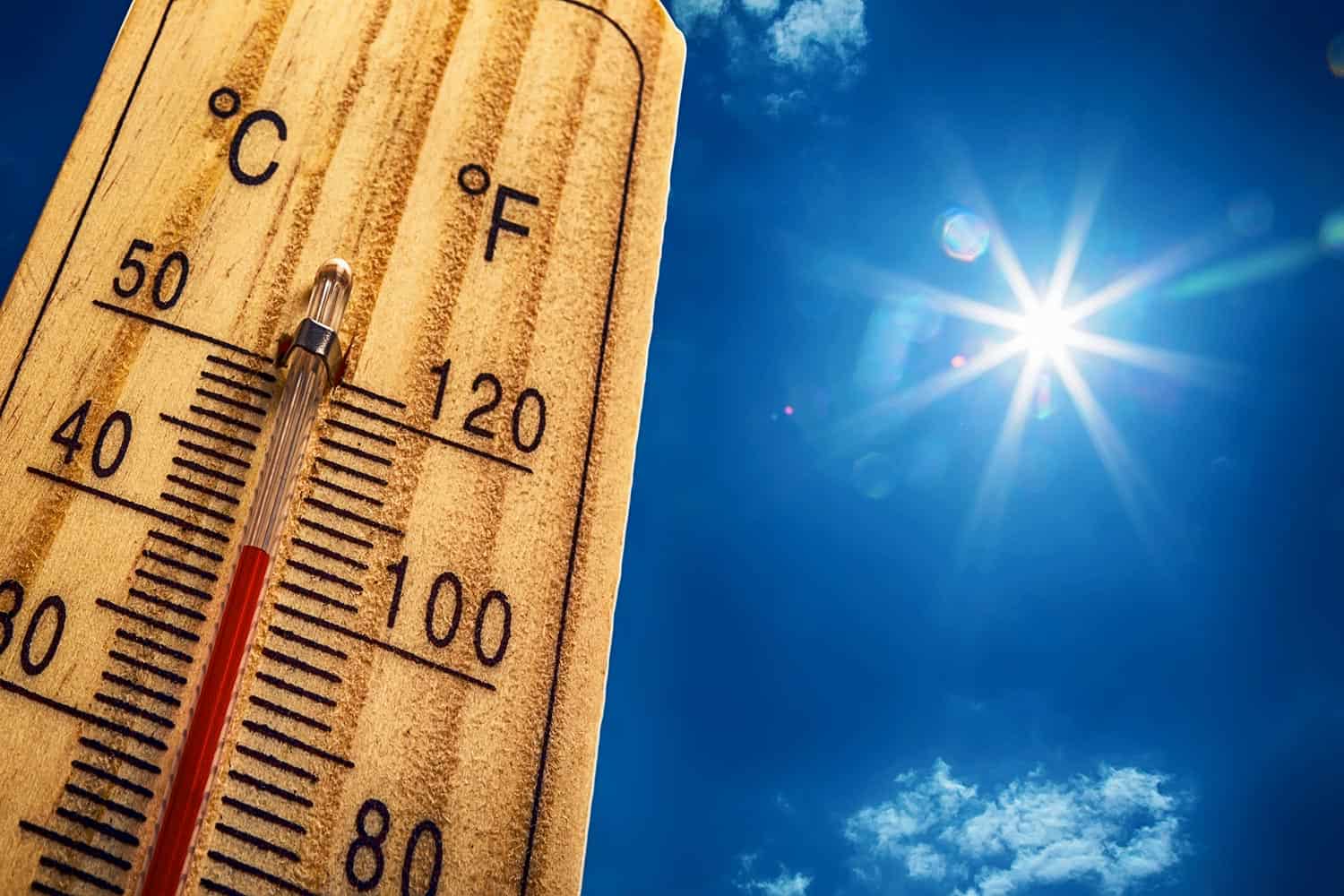
Yes, it is likely to see a fridge work harder if the weather around it is hot. Especially during the summer, warmer temperatures can cause a refrigerator to overwork itself trying to keep the food inside cold, so if you have AC, you might want to turn it on.
Besides that, if your fridge continues to release excess heat from inside into an already hot room, this can make the problem worse, essentially creating an inferno in your kitchen.
How Can I Keep My Fridge Cool In Hot Weather?
If you live somewhere hot, there are easy ways to keep a refrigerator from overheating. Some ideas to prevent overheating include:
- Make sure all of the seals/gaskets on your fridge are in good condition.
- Check your refrigerator's condenser coils and clean them if needed.
- Avoid having too much or too little food inside of your fridge.
- Set your refrigerator's temperature between 35 and 40 degrees.
- Check and change the water filter in your appliance regularly.
Of course, these are just a few ways to keep your fridge from getting too hot during warmer seasons, so if you see that the weather calls for a heatwave, try to give your refrigerator some TLC.
Do Refrigerators Release Carbon Monoxide?
Yes, if a refrigerator doesn't have proper venting, it can release carbon monoxide. Although this shouldn't happen, if a fridge is too close to a wall or has a blockage near its vents, carbon monoxide can begin to emit into your home, which is not safe for your health.
Considering that carbon monoxide doesn't taste or smell, it can be difficult to tell whether it's already present in a space. That said, if you keep your fridge's vents clean and unobstructed, carbon monoxide shouldn't become an issue, so regular maintenance and proper placement are essential.
First Alert Plug-In Carbon Monoxide Detector
This carbon monoxide detector plugs into a standard wall outlet, works even if there's a power failure, sounds an alarm once CO levels become dangerous, and comes with a seven-year limited warranty.
Follow this link to view it on Amazon.
Can A Refrigerator Catch On Fire?
Yes, a refrigerator can catch on fire if it experiences a technical/mechanical malfunction. This will often happen if your appliance's compressor overheats or if your fridge has an electrical short, so these are things to look out for.
Furthermore, a fridge may catch on fire if it has a light that doesn't turn off when the doors are closed, so there are a few causes for this.
To Wrap It All Up
Whether you have started to notice your refrigerator gets hot or haven't checked, knowing why it makes a room feel warmer is always helpful. From what we found, although a fridge can make a room's temperature rise, it shouldn't be noticeable.
A refrigerator will release its excess heat from the bottom exhaust vents, so this is normal if you feel warm air blowing. On top of that, a fridge may start to run more if it's hot outside, causing it to overheat, so try to keep the temperature in your home cool if possible.
Regardless, make sure to regularly clean and check your refrigerator's condenser coils/mechanics, and don't be afraid to reach out to a professional if issues persist.
Made it to the end? Check out these helpful related kitchen posts down below!
How Old Is My Refrigerator? Here's How To Find Out!
Refrigerator Leaking Water Inside? Here's What Could Be Wrong
Does A Refrigerator Need A Water Line? [And How To Install One]


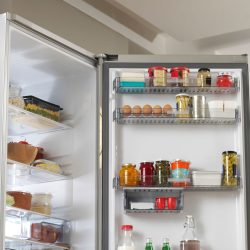

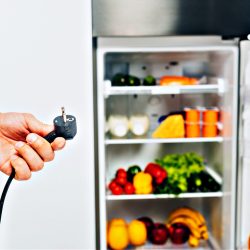

![An interior of a small kitchen in the apartment, Can A Refrigerator Be Next To A Stove Or Oven? [And How Close]](https://kitchenseer.com/wp-content/uploads/2022/03/Interior-of-a-small-kitchen-in-the-apartment-250x250.jpg)
